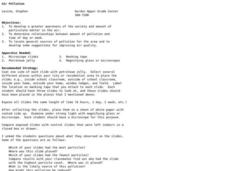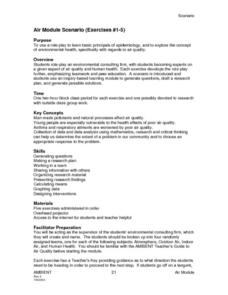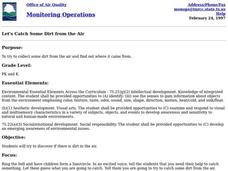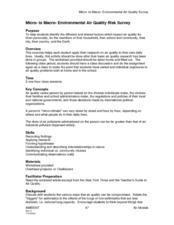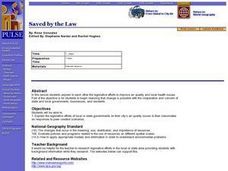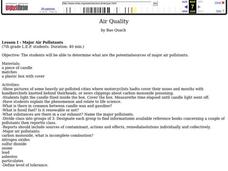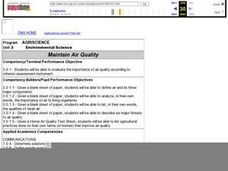Curated OER
Air Pollution
Students collect and examine particulate matter found in the air. In this pollution activity, students use microscope slides and petroleum jelly to collect particulate matter from several different locations, then use a microscope to...
Curated OER
Using Abiotic and Biotic Parameters to Monitor Air Quality
Students identify the abiotic factors that influence a river or stream and the organisms that live in it. They measure several abiotic and biotic parameters to gauge water quality. Students examine the biotic environment by identifying...
Curated OER
Air Module Scenario (Exercises #1-5)
Students, after researching/analyzing the concept of environmental health to air quality, role-play the basic principals of epidemiology. They act out a specific scenario to generate questions, draft a research plan, and generate...
Curated OER
TE Lesson: I've Gotta Get Some Air
Students investigate types and sources of indoor air pollutions both at home and in school. They decide on how to prevent poor indoor air quality. They debate smoking in order to determine how language usage can be an influence in...
Curated OER
Government Lesson Plan - Number 14
Students analyze data on air pollution in Maryland. They evaluate the effectiveness of government actions to improve air quality. Each group recommends actions that would improve air quality on the federal, state and local level.
Curated OER
Air: Air Quality Picture Project
High schoolers recognize which activities contribute to poor air quality and which contribute to good air quality. They discover how air quality is measured, and come up with ways that humans can have a positive affect on air quality.
Curated OER
Clearing the Air
Students read a New York Times article and investigate a variety of emissions that contribute to global warming. They participate in a mock international summit in which they present recommendations for reversing the global warming trend.
Curated OER
Heat, Wind and Storms Affect Air Quality
Students study heat and wind's affect on air quality. For this air quality lesson, students locate an article about air pollution. Students research a solution for the air pollution problem and use a model from nature to help them solve...
Curated OER
Is It Breathable?
Students explore air quality. In this environmental lesson, students observe a simulation of air pollution by blowing into a jar (with a straw) that has chalk dust. Students discuss how air quality can effect the way we breathe.
Curated OER
Let's Catch Some Dirt From the Air
Learners investigate the dirt in the air. In this air quality lesson, students use aluminum foil and petroleum jelly to discover if there is dirt in the air. Learners discuss results.
Curated OER
Micro- To Macro- Environmental Air Quality Risk Survey
High schoolers research the importance of air quality. In groups, students explore factors leading to poor air quality and methods of minimizing air pollution. Given a diagram of concentric circles, high schoolers survey their personal...
Curated OER
Saved by the Law
Students explain the legislative efforts of local or state governments on their city's air quality issues to their classmates as responses to peer-created scenarios. They determine that change is possible with the cooperation and...
Curated OER
What's the Connection Between Convection and Inversion?
Ninth graders observe a simulation demonstrating the difference between convection and inversion. They explain where and when convection and inversion layers occur and how each impacts air quality, and by connection, human health.
Curated OER
It's Up In the Air
Students examine a variety of tools that are used to collect scientific data. They conduct an experiment that reveals what type of particles is in the air at their school. Students report on their findings.
Curated OER
Cleaning the Air
Students investigate how engineers design methods of removing particulate matter from industrial sources to minimize negative effects of air pollution. In small groups they design and construct a filter with the goal of removing pepper...
Curated OER
Indoor Air: What's the Matter?
Young scholars investigate the variety and amount of particulate matter in the air. They locate the general sources of pollution for a specific area and develop some suggestions for improving air quality.
Curated OER
Air Terms: The Flash Card Game
Fifth graders define vocabulary words regarding air quality. In small groups, they match magazine pictures or create illustrations for definitions and terms, and share the flash cards with their group.
Curated OER
What Color is Your Air Today?
Students investigate air quality. They analyze Air Quality Index data tables, interpret the graphs, complete a worksheet, and discuss trends in air quality.
Curated OER
Dust Busters to the Rescue
Students examine the importance of cleaning up and preventing indoor air pollution. They investigate how cleaning can reduce the harmful health effects of indoor air pollution.
Curated OER
Air Quality
Students determine potential sources of major air pollutants, explain how acid rain is generated and how it affects the environment, discuss global warming, and explore protective role of ozone and cause of ozone layer thinning. Lessons...
Curated OER
Trouble in the Troposphere
Students create graphs using NASA data, compare ozone levels of several U.S. cities, analyze and evaluate the data and predict trends based on the data, and discuss and describe how human activities have modified Earth's air quality.
Curated OER
It's All in the Air
Young scholars examine air quality. They test the air for visible pollutants by observing jars for one week and compare and contrast the data they collect. After comparing and contrasting the data, they graph the results of pollution...
Curated OER
Plants and Air Purity
Learners explore how green plants help improve air quality. They read an article and discuss the importance of air quality and its effects on the human body. They investigate by connecting hose to the top of a Bell jar and to a funnel....
Curated OER
Maintain Air Quality
Students are engaged in discussing air quality through hands-on demonstrations using balloons, sealed jars, and toy cars. Students conduct a home radon test to measure their air quality.


